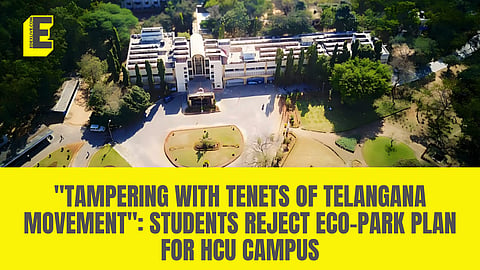

The Telangana government's latest proposal to transform the University of Hyderabad (UoH, also known as Hyderabad Central University, HCU) campus into "one of the world's largest eco-parks" has drawn strong criticism from students who see it as an attempt to divert attention from their ongoing protests against land auction.
According to The Times of India, following days of protests by students and environmentalists against the planned auction of 400 acres at Kancha Gachibowli, the government is now considering a complete overhaul — converting the entire 2,000 acres, including the university campus, into an eco-park while relocating UoH to the proposed Future City in Hyderabad's outskirts.
The move comes after the Supreme Court took suo motu cognisance of the issue and stayed all activity on the land, including tree felling.
According to the report, under the new plan, UoH would receive 100 acres in Future City along with Rs 1,000 crore for a new campus.
But students and scholars from UoH have sharply criticised the proposal, calling it a veiled attempt to neutralise protests and greenwash ecological concerns without addressing the fundamental issue, the preservation of a historic public university and its surrounding biodiversity.
“It’s an absurd proposal”
“This is a very absurd proposal,” said Nihad Suleiman, General Secretary of the HCU Students’ Union.
“World-class universities like Oxford or Harvard thrive on large, green campuses. In India, where we’re striving to build such institutes, why are we dismantling one that already exists?” he asked.
Nihad pointed out that UoH's transformation from a “barren land in 1975” to a thriving ecosystem today is due to the care and commitment of the campus community.
“From 1975 when it was given, revenue records say this was barren land, and now in 2025, if it's such a green space, it is us, the students and faculty, who have nurtured this land. If biodiversity is the concern, who is better suited to preserve it than those already doing it?”
He also rejected the legitimacy of the new proposal: “We don't think this rumour deserves more attention. Our demand remains the same: protect the university and the forest. We are focusing on legal proceedings scheduled for April 7 in the Telangana High Court and obtaining documents to fight the battle.”
“This is a betrayal of the Telangana movement”
Venky Krishna, a PhD scholar at UoH who actively participated in the protests, said the proposal not only threatens biodiversity but also undermines the political history of the region. “UoH was not just set up as a Central university. It was born in 1974 out of the Telangana movement of 1969 and the six-point formula to address regional and educational inequality, through the Act of Parliament.”
He argued that relocating the university is a symbolic erasure. “You are corroding the very tenets of the Telangana movement by tampering with its institutions. This isn’t about conservation, it's a counter-strategy to dilute the student movement.”
He further added, “This is an ego-driven move. The Congress government, particularly Revanth Reddy, wants to water down the protest by dangling the eco-park narrative.
Venky also questioned the ecological validity of the eco-park proposal, warning against introducing alien species, building artificial enclosures, and confining wildlife. “Right now, deer roam freely on campus. In a so-called eco park, they’ll be restricted to a designated enclosure. Is that conservation?” he questioned.
“Greenwashing and gentrification”
Venky also raised concerns that the eco-park, if ever created in place of the university, would eventually serve the interests of Hyderabad’s upper classes rather than environmental causes.
“Let’s not forget why this movement got traction,” said Venky and added, “It's because of the civil society in Hyderabad, the neo-rich who fear overcrowding due to IT expansion. This is as much a class issue as it is an ecological one.”
He warned that the eco-park might become an exclusive recreational zone, a “party and picnic place” accessible only to the affluent. “Who will benefit from this eco park? Not ordinary citizens. It’s just a tool to appease the rich and greenwash the displacement of a university,” he said.
Students also raised concerns about the practical challenges of relocating established infrastructure.
"We had so many constructions, new departments were constructed... How can they just relocate the entire thing and that too, in a campus of a hundred acres, which is nothing because here it's more than 600 acres," Krishna pointed out and added, "And how can they even think about it? And that too in a place alien to all of us."
No official offer yet, say UoH authorities
Meanwhile, according to the TOI report, university officials have not received any formal proposal from the state government. “If we receive such an offer, it will be placed before the executive council,” a senior UoH official said.
As the controversy continues to unfold, students remain determined to protect both the ecological and educational heritage of their campus, viewing the eco-park proposal as a distraction from their fundamental demand: preserving the university in its current form.
